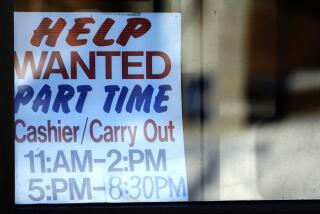Employers Need to Tap Growing Pool of Older Workers--Report
- Share via
WASHINGTON — Employers increasingly need to tap the growing pool of older workers to avoid major labor shortages, but such efforts are stymied because the elderly face many disincentives to work beyond retirement age, say two government studies released Thursday.
The need to retain, and in some cases retrain, older workers is particularly acute for highly skilled jobs, the reports said.
“A shortage of skilled workers may occur as the number of jobs requiring higher levels of skill and education increases and the number of young entrants into the labor force decreases,” one study said. “Employers will need to plan for these changes in order to maintain their work force and stay competitive in the changing labor market.”
One report was requested by outgoing Labor Secretary Ann McLaughlin to study trends among older workers and to suggest ways to encourage later retirement. The second report, requested by Congress, addressed problems faced by older working Americans.
The studies grew from increased concern about the aging of the American work force. A third report released Thursday said that a large potential labor shortage looms because the economy is projected to grow at 2% to 3% annually while the rate of work force growth will be just 1%.
McLaughlin, in a farewell meeting with reporters, said: “I think clearly that older workers should be tapped” to help remedy that problem.
The median age of workers is projected to rise from the current 36 to 39 by the end of the century, with the number of people aged 45 and over increasing from the 1986 total of 74.2 million to 96.3 million.
The government said that most employers, while aggressively pursuing members of the shrinking pool of younger workers, have ignored the special needs of older workers, including flexible scheduling, job sharing, health care and phased retirements.
Indeed, the reports portrayed a wide array of factors leading older Americans to drop out of the work force, many of them economic.
In some cases it actually costs older workers to continue working past the age when they are eligible to retire, the Labor Department study said.
The studies also pointed to Social Security and private pension provisions that penalize beneficiaries who continue or resume working.
More to Read
Inside the business of entertainment
The Wide Shot brings you news, analysis and insights on everything from streaming wars to production — and what it all means for the future.
You may occasionally receive promotional content from the Los Angeles Times.










